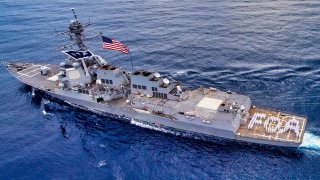How American Naval Power Enhances Its Diplomacy
U.S. Naval presence in the Eastern Mediterranean has proved a valuable asset in de-escalating the Israel-Palestine conflict.
In the wake of the deadly attack on Israeli civilians by Hamas, the USS Eisenhower, and its strike group departed to join a growing cluster of American forces that had concentrated in the eastern Mediterranean. They will not be the last U.S. forces moving eastward to bolster security following the attack on October 7.
While the global war on terror rages on, the future of the Middle East rests on a razor’s edge. The United States and its allies have redirected their intelligence and resources to help Israel stamp out Hamas-backed terrorist cells in the Levant. In the weeks following the attack, the threat level in the region has risen as Israel retaliates in Gaza. Consequently, the United States’ military readiness will be tested. It cannot afford to fail.
After the dust from Israeli airstrikes settled in Gaza, demonstrations outside of U.S. embassies in Amman and Beirut turned violent as protestors clashed with state security forces, signaling that anti-American sentiment is alive and well. With regional volatility on the rise, it is paramount that the U.S. leverages its assets in close proximity to the Middle East to deter future conflicts and mitigate ongoing ones.
One such resource is the military installation at Crete’s Souda Bay. With the rise in jihadist violence in the Middle East and Africa, this base has served as a critical anchor for the United States and its NATO allies. Since its first use for American naval operations in the late 1960s, Souda Bay has granted U.S. forces unique strategic access to Europe, the Middle East, North Africa, and the Persian Gulf.
As the extent of the Arab world’s involvement in Gaza is yet to be determined, America has boosted its military presence at Souda Bay. In October, the U.S. Air Force planned to send more C-130s and C-17s to Greece. The move came less than a week after the USS Carney, an American Arleigh Burke-class destroyer, shot down four cruise missiles and fifteen drones bound for Israel off the coast of Yemen. Some 2,200 U.S. Marines have also recently arrived in Greece, demonstrating the American commitment to using a “forward presence” to deter Hamas supporters from engaging in the developing conflict in the Middle East.
As the threat to Israel is continuously changing, the United States has shown that it is willing to be responsive and flexible to meet a growing list of needs. With Hezbollah in Lebanon and Iranian proxy forces in Syria lying in wait, Congressional lawmakers signaled that the United States must continue to expand the support it has recently provided. On November 9, several members of Congress wrote a joint letter to Defense Secretary Lloyd Austin urging him to expedite the delivery of KC-46A Pegasus refueling tankers to Israel. In the letter, Representatives Rob Wittman (R-VA), August Pfluger (R-TX), Jake Ellzey (R-TX), Mike Garcia (R-FL), and Scott Franklin (R-FL) asserted that accelerating the transfer of KC-46As “would dramatically increase our ability to help deter further aggression, project power, and improve our posture in the region.”
As America continues to transport soldiers and technology to the Mediterranean, they are sending a clear message to adversaries like Iran—“provoke us at your peril.” Even without direct involvement in the war, the mere act of putting American boots on the ground a stone’s throw away is likely to convince Israel’s rivals to think twice about launching an attack.
The United States’ support of Israel has put its military might on full display, showing the world why it is second to none as an ally and partner. Not even China or Russia could provide such staggering assistance so far from its shores in so little time. With two carrier strike groups setting up shop in the eastern Mediterranean, carrier air wings can establish total dominance in the sky.
In these dangerous times, the importance of military readiness could literally prove to be a matter of life and death. Without the help of allies like Greece, Israel might be facing an existential threat from its neighbors. Instead, thanks in part to Souda Bay, it is difficult to imagine how the United States could be better positioned to respond to the impending threat of regional instability in the Middle East.
With U.S.-China tensions rising, the United States must demonstrate an ironclad commitment to its friends and allies. As we enter a geopolitical era marked by uncertainty, nonviolent deterrence will be a critical component of American foreign policy. The United States must use its military presence to discourage further malign behavior in the Middle East and the Indo-Pacific. The Biden administration’s deployment of a massive naval presence in the Mediterranean shows that the U.S. possesses the capability and the will to use its military to preserve international order.
Souda Bay is a shining example of the American military’s ability to facilitate conflict de-escalation through partnerships with allies. In the future, the United States’ presence in the eastern Mediterranean will be a factor that any anti-Israel actor in the Middle East will have to consider if they plan on joining the conflict. Between America’s first-class naval fleet and strategic partnerships with its allies, the United States’ involvement at Souda Bay showcases its unique ability to save lives without firing a single round.
About the Author
Ethan Shapiro is the Program Manager at the Lexington Institute, a nonprofit public-policy research organization headquartered in Arlington, Virginia.
Image: U.S. Navy Flickr.


